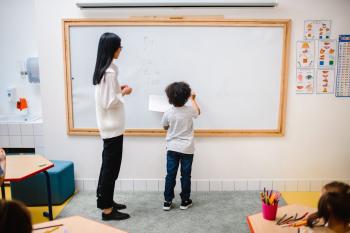How to Retain Experienced Teachers: The Power of Proper Support Systems

How to Retain Experienced Teachers: The Power of Proper Support Systems
What if the key to solving the teacher shortage crisis isn't just recruiting new educators, but keeping the experienced ones we already have? Why do so many veteran teachers leave the profession despite their passion for teaching? How can schools create environments where teachers feel valued and supported throughout their careers?
The Growing Crisis of Teacher Retention
Across the United States, schools are facing an unprecedented exodus of experienced educators. While much attention focuses on recruiting new teachers, the real crisis lies in retaining those with years of valuable classroom experience. Research shows that teachers with 5-10 years of experience are leaving at alarming rates, taking with them invaluable institutional knowledge and teaching expertise.
A real-world example comes from Clark County, Nevada, where the school district reported that while they successfully hired 2,400 new teachers in 2022, they simultaneously lost 1,800 experienced educators. This constant churn creates instability in schools and negatively impacts student learning outcomes.
The solution isn't simply higher salaries (though those help), but rather creating comprehensive support systems that address the multifaceted challenges teachers face throughout their careers.

Understanding Why Experienced Teachers Leave
The Burnout Factor
Many veteran teachers report feeling overwhelmed by increasing administrative burdens, larger class sizes, and the emotional toll of addressing students' growing social-emotional needs. A 2022 RAND Corporation survey found that teachers reported higher levels of job-related stress than other working adults.
Lack of Professional Growth Opportunities
After 5-7 years in the classroom, many teachers hit a professional plateau. Without meaningful opportunities for advancement or leadership roles that utilize their expertise, they often seek challenges elsewhere.
Feeling Undervalued
Experienced teachers frequently report feeling that their knowledge and insights aren't sought after in decision-making processes. This lack of professional respect contributes significantly to dissatisfaction.
A case study from Denver Public Schools revealed that when surveyed, 68% of departing teachers cited "lack of voice in school decisions" as a major factor in their decision to leave.

Key Strategies for Supporting Veteran Teachers
1. Create Leadership Pathways
Schools can establish formal teacher leadership positions that allow experienced educators to:
- Mentor new teachers
- Lead professional development
- Participate in curriculum design
- Contribute to school policy decisions
For example, Fairfax County Public Schools in Virginia implemented a "Teacher Leader" program that provides stipends for experienced teachers to take on these roles while remaining primarily in the classroom.
2. Provide Ongoing Professional Development
Contrary to popular belief, veteran teachers crave professional growth opportunities. Effective programs include:
- Advanced content-area training
- Instructional coaching partnerships
- Opportunities to present at conferences
- Graduate course reimbursement
3. Reduce Administrative Burdens
Schools can implement:
- Streamlined paperwork systems
- Dedicated planning time
- Classroom aides for veteran teachers
- Reduced non-teaching duties

The Power of Mentorship Programs
Well-designed mentorship programs benefit both new and experienced teachers. When veteran educators serve as mentors, they:
- Regain enthusiasm by sharing their expertise
- Develop leadership skills
- Receive stipends or reduced teaching loads
- Gain professional recognition
Chicago Public Schools' "Teach Chicago" program pairs new teachers with veteran mentors who receive training, stipends, and release time to observe and coach their mentees. Both groups report higher job satisfaction.

Creating a Culture of Respect and Collaboration
Schools that retain experienced teachers tend to share these characteristics:
- Administrators actively seek teacher input on decisions
- Professional learning communities are well-established
- Teachers have autonomy in their classrooms
- Successes are regularly celebrated
A study of high-retention schools in Massachusetts found that teachers stayed when they felt their professional judgment was trusted and their contributions mattered to the school community.

Measuring Success and Making Adjustments
Effective retention programs include:
- Annual teacher satisfaction surveys
- Exit interviews with departing teachers
- Data tracking of retention rates by experience level
- Regular program evaluations
For instance, the Montgomery County Public Schools in Maryland revamped their support systems after exit interviews revealed that veteran teachers wanted more opportunities to shape district-wide initiatives.

Conclusion: Investing in Experience Pays Dividends
Retaining experienced teachers isn't just about preventing shortages—it's about maintaining instructional quality and institutional memory. When schools invest in comprehensive support systems, they create environments where teachers can thrive throughout their careers, ultimately benefiting students and the entire school community.
The solutions exist; what's needed is the commitment to implement them systematically across all schools. By valuing and supporting our veteran educators, we can build stable, effective teaching forces that drive student success for generations to come.







